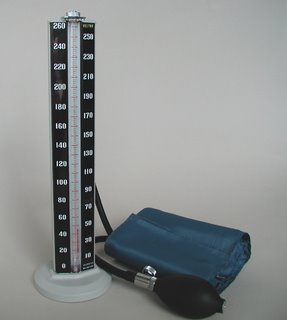Art undeniably had high blood pressure.
At age 53, he had all the “footprints” of high blood pressure that’d been present for at least several years: abnormal patterns by EKG, abnormally thick heart muscle, and an enlarged aorta by an echocardiogram. These sorts of changes require many years to develop. Art’s blood pressure was 140/85 sitting quietly in the office.
“That’s about what my primary care doc gets, too. Whenever it’s high, he takes it again after a few minutes and it always comes down.”
Art tried to persuade me that his blood pressure was high today only because of the traffic on the way into the office. When I dismissed this as a cause, he insisted that stress he’d been suffering because of his teenage son was the cause. “I just know I don’t have high blood pressure!”

Who’s right here? Well, Art is not here to defend himself. But one fact is crystal clear: you cannot develop complications of high blood pressure unless you truly have high blood pressure!
In other words, Art’s abnormal changes in heart structure (thickened heart muscle and enlarged aorta) are serious changes that develop only with years and years of sustained blood pressure at least as high as the one in the office. His blood pressure almost certainly ranged much higher at other times, particularly during stressful situations like waiting in the check-out line at the grocery store, watching a suspenseful TV show, petty irritations at his job, and on and on.
Blood pressure does not have to be high all the time to generate complications of high blood pressure. It can be sporadic, variable, even occasional. Clearly, sustained high blood pressure is the worst situation that creates adverse consequences more quickly. But blood pressure that wavers from low to high only some of the time can still, given sufficient time, cause the very same unwanted effects.
Control of blood pressure is crucial to your coronary plaque control program. Blood pressure may be boring: not as exotic, say, as lipoproteins, and not as fun as talking about nutritional supplements. But neglect blood pressure issues and you will not gain full control over coronary plaque growth—-your heart scan score will increase.
Watch for an upcoming Special Report on the Track Your Plaque Membership website, a full detailed discussion of how to recognize when blood pressure is an important issue, along with a full discussion of nutritional methods to reduce it, often sufficient to minimize or eliminate the need for medication.